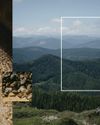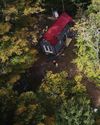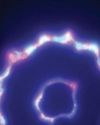
BEFORE OUR BIGFOOT TRAILER, WE WERE TENT people. But after our 2013 Subaru Forester became cramped with outdoor gear, and a few epic Colorado storms terrified our Chihuahuas, we started to consider alternatives.
Our gateway to the Bigfoot was a 1992 Jayco pop-up camper. It allowed us to camp much more comfortably, for longer, and tour around the West for Joe's bluegrass band performances. We started to consider camping permanently, but wanted a hard-sided shelter to better withstand unpredictable mountain weather. A fiberglass trailer became our best choice to replace the Jayco. Molded fiberglass is durable and easier to clean than materials like wood that are affected by moisture. These trailers are also considerably lighter than many other typical RVs and trailers (our 1981 Bigfoot B-17 SM Deluxe weighs in at 2,300 pounds, while an aluminum Airstream Bambi 16RB, a new camper of roughly the same size, starts at 3,000 pounds). And fiberglass trailers hold their value, particularly Bigfoots, a higher-end brand with plenty of reliable models still around today.
We had some unique requirements for our home. Joe is 6'1" and plays violin, which means he needs roomy proportions to play while standing up inside the trailer. And being outdoorsy people, we need sunlight. Most RVs and campers have hardly any windows, it seems, but after venturing down a forum dedicated to fiberglass RVs, we found our 1981 Bigfoot trailer in the classifieds. This particular model is 106 square feet, boasts 6'6" of interior headroom, fell within our budget at $7,500, and has windows facing nearly every direction. It ticked all the boxes. We had to have it.
Denne historien er fra May - June 2022-utgaven av Popular Mechanics.
Start din 7-dagers gratis prøveperiode på Magzter GOLD for å få tilgang til tusenvis av utvalgte premiumhistorier og 9000+ magasiner og aviser.
Allerede abonnent ? Logg på
Denne historien er fra May - June 2022-utgaven av Popular Mechanics.
Start din 7-dagers gratis prøveperiode på Magzter GOLD for å få tilgang til tusenvis av utvalgte premiumhistorier og 9000+ magasiner og aviser.
Allerede abonnent? Logg på

ONE OF THE 'GREATEST THREATS' TO THE PACIFIC NORTHWEST ISN'T WHAT YOU THINK.
EXPERTS ARE PREPARING THE REGION AGAINST THE THREAT OF DANGEROUS VOLCANIC MUDFLOWS, KNOWN AS LAHARS, WHICH COULD INUNDATE THE COMMUNITIES SURROUNDING MT. RAINIER IN AS LITTLE AS 30 MINUTES.

THE WORLD'S TOUGHEST ROW
They rowed 3,000 miles across the Atlantic, battling unpredictable weather, chaotic seas, and finicky equipment. But what they discovered gave them profound new insights into the power of the ocean.

HOW TO DIY OFF-GRID SOLAR
SPEND THE TIME UP FRONT AND PLAN IT CAREFULLY TO AVOID DISAPPOINTMENT

Are We on the Verge of an ARMS RACE in SPACE?
RUMORS OF A RUSSIAN SPACE NUKE, ALONG WITH OTHER SATELLITE-TARGETING WEAPONS, HAVE MADE GEOPOLITICAL TENSIONS EXTEND INTO ORBIT.

Fresh Fingerprints on an Ancient Statue
A CLAY FIGURINE HAS SPENT MILLENNIA incomplete, waiting at the bottom of a lake for its long-dead craftsman to finish the Iron Age-era statuette.

Quantum Entanglement in Our Brains
IT HAS LONG BEEN ARGUED THAT THE human brain is similar to a computer. But in reality, that's selling the brain pretty short.

The Tools of Copernicus
WAY BACK IN 1508, WITH ONLY LIMited tools at his disposal, Nicolaus Copernicus developed a celestial model of a heliocentric planetary system, which he described in hist landmark work De revolutionibus orbium coelestium. It was a complete overhaul of our conception of the universe-one that, unfortunately, earned him the ire of the Catholic church for decades after his death-and forever changed the way we look at the stars.

Building a Sixth-Generation Bomber Raptor
THE GLOBAL COMBAT AIR Programme (GCAP)-a project by the U.K., Italy, and Japan to develop a sixth-generation stealth fighter-has been busy at the drawing board reshaping its vision of the future of air warfare. And judging by the new concept model unveiled at this year's Farnborough air show, that future has big triangular wings.

The Electroweak Force of the Early Universe
TODAY, THE UNIVERSE AS WE KNOW IT IS governed by four fundamental forces: the strong nuclear force, the weak nuclear force, electromagnetism, and gravity.

This Ancient Fossil With a Brain and Guts
WE KNOW WHAT FOSSILS LOOK like. For example, typical dinosaur fossils are bones turned to stone and preserved from the passage of time, located, if we're particularly lucky, in large collections that can be reassembled to represent the beast they used to prop up in their entirety.